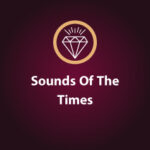Have you ever thought about how quiet the world of television and movies can be? If two characters are eating at a restaurant or working in an office, we don’t have to worry about trying to hear them over the sound of clinking glasses or crinkling paper, or anyone else who might be making too much noise in the background. Cinematic sound tells us just as much of the story as the images, and unless they’re part of the story, footsteps and rustling clothes aren’t usually something we want to hear coming from the speakers.
Movies are filmed in the same noisy, unpredictable world we all live in, though, and life doesn’t come with a mute button, though it’d be nice if it did. So how do they do it? The right microphone, soundproofing, and studio environment all go a long way, of course, and a talented sound editor, such as my own editor Humberto Franco, can work wonders in post-production. But there’s only so much that can be cleaned up or kept away from the microphone: everything we do makes some kind of sound. That’s why prop masters also use something called “silent props,” or “noiseless props,” to take the everyday noise that we can’t get rid of completely and turn it into a different, more soothing kind of sound.
One prop master whose TikTok videos earlier this year helped bring the idea of silent props to the public eye is Scott Reeder, who’s been working in Hollywood for over three decades. For recording a conversation during a game of pool in the show Friday Night Lights, without having the actors pausing for each shot, he came up with the idea of repainting soft plastic racquetballs to look like pool balls. When the camera needed to show one of the shots, he swapped the prop balls with the real thing and then switched them back.
If you’d like to check out Scott’s mixture of movie-making insights and punny dad jokes, you can find the link to his recent video on creating silent horseshoes here:
When it comes to recording cinematic dialogue, there’s a surprising amount of unintentional sound that needs to be hidden from the microphone. UK filmmakers Robert Carr and Richard Scott, who run the YouTube channel The Film Look, talk about the challenge of filming an authentic restaurant scene, and how masking the sound of a glass being set down on a table, which is usually about the same height as the actor’s microphone, can be as simple as discreetly placing a cushion on the table, or as involved as having a stagehand hiding just below the frame to take the glass from the actor.
In a later video, they demonstrate a do-it-yourself approach to concealing sound, using neoprene rubber and glue to create and attach soundproof pads to everything from the bottom of a coffee mug to the soles of an actor’s shoes. If you want to learn more about the art of indie filmmaking and cinematic audio, I have a link to The Film Look’s “Indie Film Sound Guide” video here:
But when it comes to bigger productions, the silent props are more likely being bought rather than built, and they’re sold by pioneering prop master Tim Schulz and his company Prop TRX, the only dedicated maker of noiseless props. From paper bags made from coffee filter fabric and gift tissue that hardly makes a sound to clear rubber ice cubes that don’t clink against the glass, his storefront’s becoming popular not only with filmmakers but with curious people who just want to see what the fuss is about.
There’s a video link on my blog to a wonderful interview with Tim Schulz about how he creates his silent props, as well as a link to Prop TRX’s homepage so you can take a look for yourself:
If you want to hear just what a silent lunch bag or noiseless cellophane wrap sounds like, there’s also a video link on my blog to one of my favorite ASMR artists as she compares everyday items with their silent movie prop versions. Even if you aren’t usually into ASMR, it’s a fascinating video that shows just how much quieter the silent props really are in comparison, and definitely worth a watch:
As the modern world becomes a faster, busier, and noisier place, more and more attention is being paid to the soundscapes that we create, intentionally or even by accident. Whether it’s with silent props, musical branding, or audio interfaces, we’re working to create a world filled with the sounds we want to hear.
Would you consider giving this podcast an honest review? You can do that here: https://lovethepodcast.com/audiobranding. And if you like what you hear (and read!) – please do share it with anyone you think might be interested. Thanks so much!
And if you’re interested in crafting an audio brand for your business, why not check out my FREE download – Top 5 Tips For Implementing An Intentional Audio Strategy at https://voiceoversandvocals.com/audio-branding-strategy/
